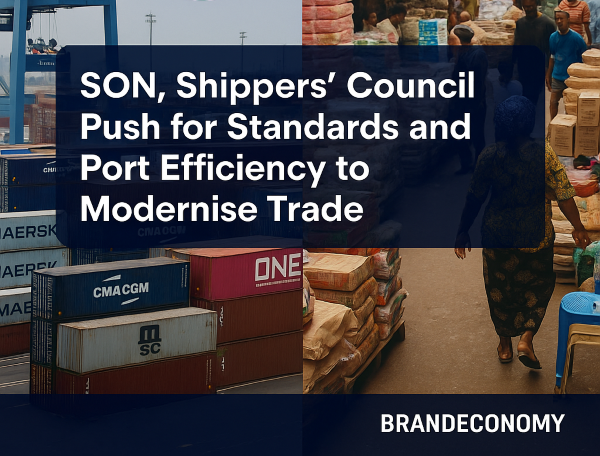SON, Shippers’ Council Push for Standards and Port Efficiency to Drive Trade Modernisation

Nigeria’s quest to modernise trade and enhance global competitiveness received renewed momentum as the Standards Organisation of Nigeria (SON) and the Nigerian Shippers’ Council (NSC) pledged deeper collaboration to strengthen regulation, improve port efficiency, and empower trade associations nationwide.
The commitment was reaffirmed during the 2025 Annual General Meeting and All Markets Conference (AMC 25) of the Ndigboamaka Progressive Markets Association, held in Lagos — a forum that continues to serve as a powerful convergence point for traders, manufacturers, regulators, and policymakers shaping Nigeria’s commerce ecosystem.
Trade Associations as Catalysts for Economic Growth
Speaking at the conference, Dr. Ifeanyi Okeke, Director-General of SON, lauded Ndigboamaka’s leadership for fostering collaboration and innovation among market leaders, describing such engagements as critical to national commerce and enterprise development.
Represented by Mr. Solomon Joseph, Assistant Director and Head of Complaints at SON, Okeke noted that trade associations remain the lifeblood of Nigeria’s informal economy, bridging government policies with grassroots enterprise.
“In a country where the informal sector employs more than 40 million Nigerians, trade associations play a vital role in linking traders and artisans to formal structures that enhance productivity, inclusion, and stability,” he said.
Okeke emphasised that the Renewed Hope Agenda of President Bola Ahmed Tinubu has placed economic diversification, digital transformation, and enterprise development at the centre of national priorities. SON, he said, is fully aligned with this vision by enforcing standards that ensure goods and services meet global benchmarks while supporting sustainable business practices.
Standards as Enablers of Business Competitiveness
Addressing the conference theme — “Empowering Trade Associations for Revenue Generation and Modernisation” — Okeke reiterated that standards are not barriers but enablers of growth and competitiveness.
“Adherence to quality standards enhances consumer trust, expands access to regional and international markets, and lays the foundation for lasting business success,” he stated.
He cited SON’s flagship initiatives — the Mandatory Conformity Assessment Programme (MANCAP) for local manufacturers and the SON Conformity Assessment Programme (SONCAP) for importers — as safeguards against substandard goods.
Okeke also unveiled the forthcoming Product Authentication and Tracking System (PATS), a mobile-enabled platform that allows consumers to instantly verify product authenticity. He added that SON has fully digitalised its certification and verification systems, streamlining operations to support the Federal Government’s ease of doing business policy.
Collaboration to Combat Counterfeiting and Boost Trade Transparency
In line with Nigeria’s trade facilitation agenda, SON is partnering with the Nigeria Customs Service (NCS) and other agencies through the National Single Window Project to enhance transparency, cut red tape, and improve port operations.
Acknowledging traders’ challenges — including multiple taxation, poor infrastructure, and counterfeit products — Okeke called for joint stakeholder action anchored on integrity, compliance, and innovation.
“The prosperity of Nigeria’s markets depends on standards, not shortcuts. Compliance drives confidence, and confidence drives growth,” he said.
Shippers’ Council: Efficiency and Regulation as Trade Enablers
Echoing this stance, Dr. Ukeyima Akuta, Executive Secretary of the Nigerian Shippers’ Council (NSC), reaffirmed the council’s commitment to modernising Nigeria’s port system for greater efficiency and competitiveness.
In his presentation titled “The Role of the Nigerian Shippers’ Council as Port Economic Regulator in Facilitating Import/Export and Empowering Trade Unions for Revenue Generation and Modernisation”, Akuta — represented by Mr. Femi Omonayin, Assistant Director of Stakeholders Service — described trade as the engine of economic growth, noting that efficient ports are central to global trade competitiveness.
He outlined the NSC’s mandate as a port economic regulator, ensuring fairness, transparency, and competitiveness across the maritime value chain. The council, he said, continues to regulate tariffs and charges, promote operational efficiency, and advocate automation in port operations to reduce bottlenecks and foster faster cargo turnaround.
Empowering Trade Unions for National Prosperity
The NSC, Akuta explained, works closely with trade unions like Ndigboamaka through structured engagements, stakeholder training, and conflict resolution mechanisms. These partnerships, he said, promote industrial harmony and prevent disruptions that could undermine trade flows.
“Empowering trade unions and modernising port operations directly translate into increased government revenue, foreign investment, job creation, and the adoption of global best practices in logistics and port infrastructure,” Akuta said.
He noted that the Council is not just a regulator but a catalyst for sustainable trade growth, balancing the interests of port operators, shipping lines, and traders to create a more transparent and efficient maritime sector.
Driving the Future of Trade Modernisation
As Nigeria deepens its commitment to trade facilitation and diversification, both SON and NSC have positioned themselves as strategic enablers in the push for a globally competitive economy. Through standardisation, digitisation, and stakeholder collaboration, the two institutions are laying the foundation for a modernised trading ecosystem that supports inclusive growth, enhances investor confidence, and promotes long-term national prosperity.











